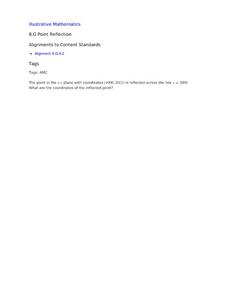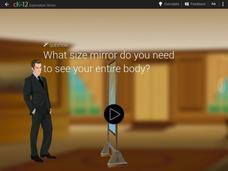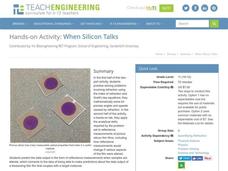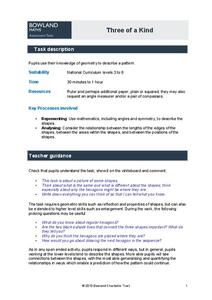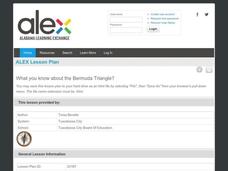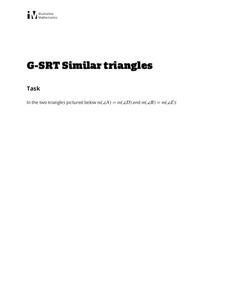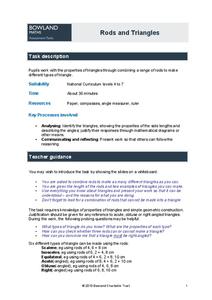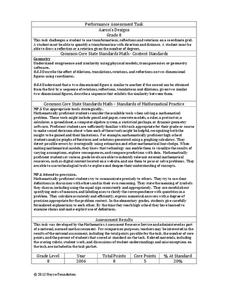Virginia Department of Education
Classifying Angles
Don't be obtuse, this geometry unit is the just the right resource for educating the acute young minds in your class. From classifying and measuring angles, to determining the congruence of shapes, this...
Curated OER
Point Reflection
Use this task as an exit ticket for your eight graders during the geometry unit. All they need to do is identify the coordinates of a point reflected over y=2000.
Curated OER
Reflection and Refraction
What is a prism? A place for light waves that commit minor refractions! The thorough resource includes three hands-on investigations covering light reflection and refraction; mirrors, lenses, and images; and optical systems. Subject...
CK-12 Foundation
Prom Night
Create the perfect prom night image using the Law of Reflection! An interactive lesson explores angles of reflection when looking in a full-length mirror. Learners change the distance from the mirror and length of the mirror and watch...
EngageNY
Definition of Reflection and Basic Properties
Discover the results of reflecting an image. Learners use transparency paper to manipulate an image using a reflection in this fourth lesson plan of 18. They finish by reflecting various images across both vertical and horizontal lines.
EngageNY
Special Triangles and the Unit Circle
Calculate exact trigonometric values using the angles of special right triangles. Beginning with a review of the unit circle and trigonometric functions, class members use their knowledge of special right triangles to find the value...
Teach Engineering
When Silicon Talks
Explore Snell's Law using thin films. In the fifth installment of a seven-part series, pupils solve a set of problems relating to Snell's Law and use this skill during an experiment requiring the collection of reflective measurements...
Curated OER
Transformations in the Coordinate Plane
Your learners connect the new concepts of transformations in the coordinate plane to their previous knowledge using the solid vocabulary development in this unit. Like a foreign language, mathematics has its own set of vocabulary terms...
Math Solutions
Shape Sorting: Looking for Green!
Young mathematicians rotate, flip, and sort their way to an understanding of the different attributes of geometric figures. Using transparent yellow and blue shapes, children try to match congruent figures together...
EngageNY
Looking More Carefully at Parallel Lines
Can you prove it? Making assumptions in geometry is commonplace. This resource requires mathematicians to prove the parallel line postulate through constructions. Learners construct parallel lines with a 180-degree rotation and then...
Bowland
Three of a Kind
One is chance, two is a coincidence, three's a pattern. Scholars must determine similarities and differences of a regular hexagon undergoing dilation. They look at lengths, angles, areas, and symmetry.
Alabama Learning Exchange
What You Know About the Bermuda Triangle?
Get lost in the classifications. Using the backdrop of the Bermuda Triangle, pupils classify it by angle and side measures. They also learn information about the triangle and its history.
Flipped Math
Rotations
Turn the class around. Scholars define rotations of multiples of 90 degrees and create algebraic mappings for them. After an introduction to symmetry, pupils determine which letters of the alphabet have rotational and reflectional...
Mathematics Vision Project
Geometric Figures
Logical thinking is at the forefront of this jam-packed lesson, with young mathematicians not only investigating geometric concepts but also how they "know what they know". Through each activity and worksheet, learners wrestle with...
EngageNY
Characterize Points on a Perpendicular Bisector
Learn transformations through constructions! Pupils use perpendicular bisectors to understand the movement of a reflection and rotation. They discover that the perpendicular bisector(s) determine the line of reflection and the...
EngageNY
Addition and Subtraction Formulas 2
Knowing the addition formulas allows for the calculations of double and half formulas. The fourth installment of 16 has the class use the addition formula to develop the double angle trigonometric formulas. Using the double formula,...
Illustrative Mathematics
Similar Triangles
Proving triangles are similar is often an exercise in applying one of the many theorems young geometers memorize, like the AA similarity criteria. But proving that the criteria themselves are valid from basic principles is a great...
Illustrative Mathematics
Lines of Symmetry for Quadrilaterals
Explore how lines of symmetry help define different categories of quadrilaterals. Looking at a square, rectangle, trapezoid, and parallelogram, young mathematicians discover that each shape has its own, unique symmetry. Encourage your...
Charleston School District
Review Unit 2: Congruence and Similarity
Review for the test with a comprehensive list of terms and concepts for the unit on congruence and similarity. It divides divides the sections in the order of the lessons presented during the unit.
Bowland
Rods and Triangles
Scholars explore triangles with rods of different lengths. Using rods of 2, 4, 6, 8, and 10 cm class members build as many different types of triangles as they can. They also describe properties of these triangles and determine...
Inside Mathematics
Aaron's Designs
Working with transformations allows the class to take a turn for the better. The short assessment has class members perform transformations on the coordinate plane. The translations, reflections, and rotations create pattern designs on...
EngageNY
Modeling with Inverse Trigonometric Functions 1
Where should I stand to get the best view? Pupils use inverse trigonometric functions to determine the horizontal distance from an object to get the best view. They round out the lesson by interpreting their answers within context.
Rice University
College Physics for AP® Courses
Take a look at an organized physics course. The 34-section electronic textbook covers material in AP® Physics 1 and 2. Teachers use the text to supplement lectures and have the class work through the labs. Each section contains...
EngageNY
Construct and Apply a Sequence of Rigid Motions
Breaking the rules is one thing, proving it is another! Learners expand on their previous understanding of congruence and apply a mathematical definition to transformations. They perform and identify a sequence of transformations and use...

